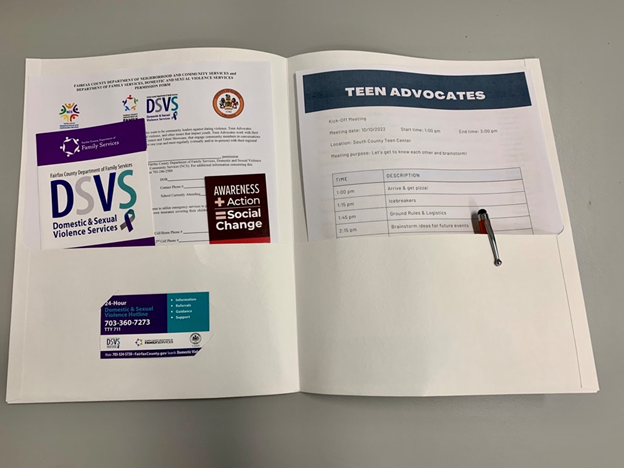
(Posted 2023 February)
Meet Members of the Teen Advocates Program
 In honor of Teen Dating Violence Awareness Month, we asked our teen advocates to “raise their voices” about what volunteering in the program has meant to them. The Teen Advocates Program, a partnership between DSVS and Neighborhood & Community Services, is comprised of a group of community leaders ages 12 to 19 that participates in campaigns to raise awareness about dating violence, sexual violence, and other issues that impact youth.
In honor of Teen Dating Violence Awareness Month, we asked our teen advocates to “raise their voices” about what volunteering in the program has meant to them. The Teen Advocates Program, a partnership between DSVS and Neighborhood & Community Services, is comprised of a group of community leaders ages 12 to 19 that participates in campaigns to raise awareness about dating violence, sexual violence, and other issues that impact youth.
Teen Advocates had their first meeting this school year in October and have been meeting biweekly (sometimes more!) since. A handful of them were also part of the program last spring, too. Three of our Teen Advocates, Belen Ertta, Maggie Nguyen, and Keshav Rawat, share their thoughts on the following questions.
Why should someone become a Teen Advocate?
Belen: Being a Teen Advocate offers experiences with organizing and planning events, as well as educating yourself on a prevalent topic in adolescent culture--all the while receiving service learning hours and building relationships.
Maggie: It's such a good way to show leadership skills and engage with new people within the area. Being a Teen Advocate means standing up for the teen generation, or Gen Z in this case, about injustices in the world, specifically the harms of dating violence. It’s vital for spreading awareness and bringing peace in society today.
Keshav: Someone should become a Teen Advocate so they can become educated about dating violence, signs of dating violence, and how to act if ever faced with a situation like this.
What is challenging about preventing dating and sexual violence?
Maggie: There are many challenges, but one that I think is more prominent is physically taking action to get help. Being in a continuous cycle of abuse is difficult to get out of since it's seen as "casual" or "normal" to the abused compared to others who see this is inhumane.
Keshav: The main thing that is challenging about preventing dating and sexual violence is that most people are not educated about the topic and don't know how to face it when it happens.
What is the best part of being a Teen Advocate?
Belen: The community and the open mindedness of others. Everyone displays such a welcoming, active, and mindful attitude.
Maggie: It's definitely getting to know other Teen Advocates who share the same interest in learning about the dangers of dating violence and finding ways to combat it. Ranging from freshman to seniors in high school, it's nice seeing a diverse collective of minds come together! I enjoy hearing our fun ideas about what we plan to do for the community.
Keshav: For sure the atmosphere and kind welcoming attitude the host and students keep. It really lightens the mood.
What has been your favorite lesson so far? What did you like about it? What did you learn?
Maggie: Learning about the five types of dating violence. Talking in depth about the impacts of financial manipulation was a subject I did not know much about, so hearing ways money is used to one's advantage really put things into more perspective.
Keshav: The one where we watched a video about a scenario of a boy and a girl facing dating violence and how the girl handles it. I liked how it showed something like this could happen in real life and some signs to be ready for it.
What advice do you have for people who may be thinking about becoming a Teen Advocate in the future?
Belen: Don't be afraid to speak. The lessons and information shown may be hard to grasp or understand. Asking questions is perfectly valid. Nobody is going to judge someone for being confused.
What do you wish you could do more of as a teen who wants to prevent violence?
Maggie: I wish I could physically talk to those who have been affected by this type of violence--regardless of whether it's on a small or large scale. Hearing stories from those who have overcome would help give me a strong sense of determination to bring a less stereotyped mindset to the public.
This article posting is part of the Domestic and Sexual Violence Services' Volunteer Voices monthly newsletter for current and potential volunteers. If you're not already a volunteer, learn how to get involved. Find out about upcoming trainings, volunteer trainings, happenings around the DSVS office and information about articles, books, media recommendations and more.
Learn more about the Domestic and Sexual Violence Services (DSVS).

